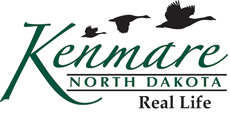Kenmare ND - Features
Real People. Real Jobs. Real Adventures.
Thanks for reading some of the latest features about area people and events.
To view every page and read every word of The Kenmare News each week,
subscribe to our ONLINE EDITION!
New challenges as harvest completion remains uncertain...
As farmers struggled to complete the 2019 harvest, one thing after another kept delaying it, and now that a major winter storm has passed through the state, it most likely won’t be completed, at least not this year.
12/03/19 (Tue)
As farmers struggled to complete the 2019 harvest, one thing after another kept delaying it, and now that a major winter storm has passed through the state, it most likely won’t be completed, at least not this year.
Some of the crops, such as corn and sunflowers, may have to wait until spring, but that poses a whole new set of challenges, according to CHS SunPrairie General Manager Brad Haugeberg.
“It might be next spring for some of it,” he said. “There is a fair amount of wheat and some flax that is still out there. The remaining question is, how to deal with the ground to be able to plant a crop in it next year? Time will tell that story.”
Burke County Extension agent Dan Folske can already see a short time window when it would be safe to harvest remaining grain in the spring, then turn around and get seeding equipment out.
“Corn could probably stand until spring before harvesting it,” Folske said. “The problem will be how late they will have to wait in the spring before they can get in the field and being able to plant next year’s crop.”
If that’s not enough, those counties that do have large acreages of corn and/or sunflowers, are facing a propane shortage for their grain dryers.
According to the National Sunflower Association,
And with moisture content much higher than average, that has put stress on propane distribution.
“Producers still have a lot of sunflower to harvest,” said Tina Mittelsteadt, business manager for the National Sunflower Association in
Some farmers have tried drying non-traditional crops such as soybeans or wheat, which further stresses the pool of propane for the farm sector.
Most of what remains in the region is wheat and flax. Folske said approximately 20 percent of the wheat and durum in
“Both crops struggled to dry down this fall,” he said. “It’s hard to put a number on the acres still standing, but it is significant.”
Mostad believes what is unharvested now, outside corn and sunflowers, will not get combined.
“It’s unfortunate because there was a good crop this year,” he said. “The producers are missing out on selling and we’re missing out on buying those bushels.”
And that presents its own challenge to the elevator itself. The biggest issue facing Berthold Farmers Elevator now is the lack of grain coming into the elevator.
“Our business runs on volume, and without the volume, we struggle,” Mostad said. “We are able to work with quality concerns, lower prices and even logistical concerns, but volume is what really drives our business.”
It doesn’t stop there. Renville Elevator General Manager Carl Zeltinger says approximately one-third of the wheat acres in the Tolley area didn’t get harvested and he admits that’s a conservative number, as it could even be higher.
There’s also some flax and canola remaining in the ground.
“Most of those acres are already written off in crop insurance, so they will not see a combine,” Zeltinger said. “The quality of wheat left in the field is a feed grain at best.”
Luckily, most of the soybeans did get taken off in between rain and snow events. However, sunflowers and corn are going really slowly because of the high moisture content, and like Haugeberg and Folske reported, those crops might have to wait until spring.
“The biggest issue going forward is to keep enough cash flow on the farm to keep the great farmers going,” Zeltinger said. “As far as the elevator goes, our biggest issue is how much grain are we going to handle going forward and it is looking like it could be very slow until new crop 2020 because a lot of our acres are not going to get harvested.”
Zeltinger believes there will be a lot of prevent plant acres in 2020 if northwestern North Dakota gets the winter moisture everyone seems to be talking about.
“Time will tell, but we are very wet now and winter is just beginning,” he said. “Pray for a dry spring so we can get the crop planted.”
Niobe producer Lenny Rodin was able to finish his soybean harvest but has had to “write off” 480 acres of spring wheat.
Rodin was somewhat concerned about the lack of propane in the region, but after the weekend storm, it’s no longer an issue, at least not for now.
“I still have more than 500 acres of sunflowers,” Rodin said. “They will probably have to wait until spring.”
According to Rodin, this unprecedented harvest, or lack of it, is driving the general mood of farmers and farm workers, which in effect, is beginning to look like dominos falling.
It puts into perspective how important farming and ranching are to
“A lot of farmers are down and struggling,” Rodin said. “But the best psychological remedy for that is to take the focus off of self and do something for someone else.”
According to Haugeberg, those rail car issues that popped up in recent years that CHS SunPrairie, Renville Elevator and Berthold Farmers Elevator all had, seem like a distant memory now after what’s emerged this fall.
“What producers are waiting for is some kind of a market rally,” he said. “I’m not sure when that’s going to happen. Maybe if we finalize some of the trade issues?...” ... Read EVERY WORD on EVERY PAGE of The Kenmare News by subscribing--online or in print!


